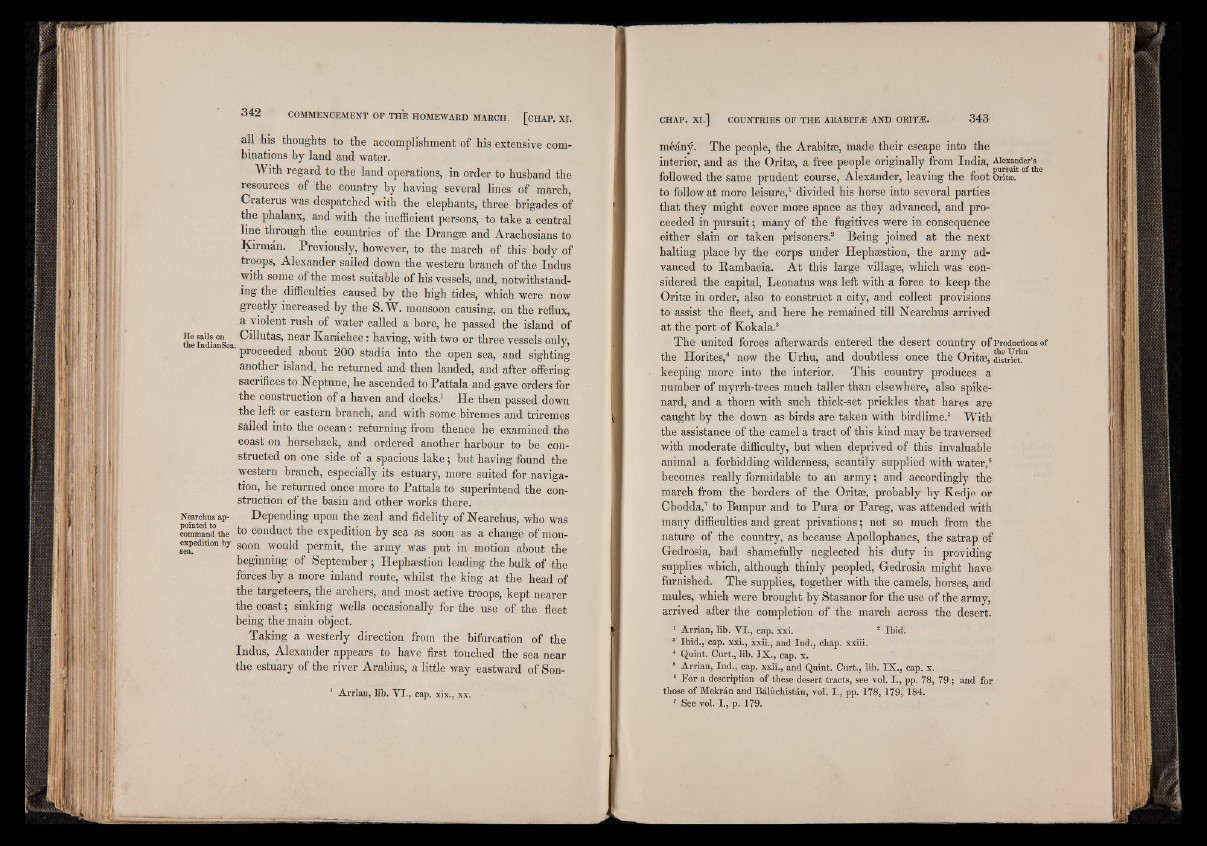
all his thoughts to the accomplishment of his extensive combinations
by land and water.
With regard to the land operations, in order to husband the
resources of the country by having several lines of march,
Craterus was despatched with the elephants, three brigades of
the phalanx, and with the inefficient persons, to take a central
line through the countries of the Drangse and Arachosians to
Kirman. Previously, however, to the march of this body of
troops, Alexander sailed down the western branch of the Indus
with some of the most suitable of his vessels, and, notwithstanding
the difficulties caused by the high tides, which were now
greatly increased by the S.W. monsoon causing, on the reflux,
a violent rush of water called a bore, he passed the island of
the indianSea ^ ^ u^as’ -Qear Rarachee: having, with two or three vessels only,
proceeded about 200 stadia into the open sea, and sighting
another island, he returned and then landed, and after offering
sacrifices to Neptune, he ascended to Pattala and gave orders for
the construction of a haven and docks.1 He then passed down
the left or eastern branch, and with some biremes and triremes
sailed into the ocean: returning from thence he examined the
coast on horseback, and ordered another harbour to be constructed
on one side of a spacious lake; but having found the
western branch, especially its estuary, more suited for navigation,
he returned once more to Pattala to superintend the construction
of the basin and other works there.
Nearchnsap- Depending upon the zeal and fidelity of Nearchus, who was
command, the to Conduct the expedition by sea as soon as a change of monexpedition
by soon would permit, the army was put in motion about the
beginning of September; Hephaestion leading the bulk of the
forces by a more inland route, whilst the king at the head of
the targeteers, the archers, and most active troops, kept nearer
the coast; sinking wells occasionally for the use of the fleet
being the main object.
Taking a westerly direction from the bifurcation of the
Indus, Alexander appears to have first touched the sea near
the estuary of the river Arabius, a little way eastward of Son-
1 Arrian, lib. V I., cap. xix., xx.
meany. The people, the Arabitse, made their escape into the
interior, and as the Oritse, a free people originally from India, Alexander’s
n 11 , , , A1 1 1 followed the same prudent course, Alexander, leav-i ng t1h e tno' ot pursuit of the Orit®.
to follow at more leisure,1 divided his horse into several parties
that they might cover more space as they advanced, and proceeded
in pursuit; many of the fugitives were in consequence
either slain or taken prisoners.2 Being joined at the next
halting place by the corps under Hephsestion, the army advanced
to Rambacia. At this large village, which was considered
the capital, Leonatus was left with a force to keep the
Oritae in order, also to construct a city, and collect provisions
to assist the fleet, and here he remained till Nearchus arrived
at the port of Kokala.3
The united forces afterwards entered the desert coun try of Productions of
the Horites,4 now the Urhu, and doubtless once the Oritse, Strict.U
keeping more into the interior. This country produces a
number of myrrh-trees much taller than elsewhere, also spikenard,
and a thorn with such thick-set prickles that hares are
caught by the down as birds are taken with birdlime.5 With
the assistance of the camel a tract of this kind may be traversed
with moderate difficulty, but when deprived of this invaluable
animal a forbidding wilderness, scantily supplied with water,6
becomes really formidable to an army; and accordingly the
march from the borders of the Oritae, probably by Kedje or
Chodda,7 to Bunpur and to Pura or Pareg, was attended with
many difficulties and great privations; not so much from the
nature of the country, as because Apollophanes, the satrap of
Gedrosia, had shamefully neglected his duty in providing
supplies which, although thinly peopled, Gedrosia might have
furnished. The supplies, together with the camels, horses, and
mules, which were brought by Stasanor for the use of the army,
arrived after the completion of the march across the desert.
1 Arrian, lib. VI., cap. xxi. ! Ibid.
8 Ibid., cap. xxi., xxii., and Ind., chap. xxiii.
4 Quint. Curt., lib. IX ., cap. x.
8 Arrian, Ind., cap. xxii., and Quint. Curt.j lib. IX ., cap. x.
8 For a description of these desert tracts, see vol. I., pp. 78, 7 9 ; and for
those of Mekran and BaluchistAn, vol. I ., pp. 178, 179, 184.
7 See vol. I., p. 179.